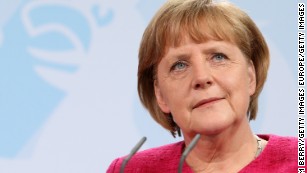Germany rolls up refugee welcome mat to face off right-wing threat
Page 1 of 1
 Germany rolls up refugee welcome mat to face off right-wing threat
Germany rolls up refugee welcome mat to face off right-wing threat
Berlin (CNN)Nearly four years after almost 1 million refugees were welcomed into the country, Germany has quietly been closing the window on asylum applications and ramping up deportations.
This trend has continued even as the number of people arriving in Europe has dropped 80% since the height of the migrant crisis in 2015, according to the UN.
On Wednesday, Interior Minister Horst Seehofer announced that in 2018 Germany received about 185,000 asylum applications, a drop of 17% from last year, and far fewer than the 2015 peak of 890,000.
"We now have the problem under control. We have put things in order," said Seehofer. "We offer protection for people who are vulnerable. However, the population will only accept asylum rights if we can repatriate those who don't need to be protected.''
Seehofer proudly stated that the number was well within the "upper limit" to migration agreed by Germany's coalition government.
But what he didn't say was that while the number of applications is dropping, the number of deportations appears to be rising.
Interior Ministry figures provided in response to a question from lawmakers from The Left party show that following the migrant crisis the number of deportations nearly doubled to 20,000 a year and have stayed roughly at that level ever since, despite the steep drop in arrivals.

Who is Angela Merkel?02:15
Last year, more than 8,000 people were sent back to the European Union states they first arrived in.
The deportation numbers also reveal how EU countries continue to squabble over who should be responsible for incoming asylum-seekers. More than 30% were repatriated back to Italy, for example, but Greece refused to accept the majority of transfer requests from Germany, and Hungary accepted none at all.
The figures also give some indication of Germany's shift away from the "Wilkommenskultur" or "welcome culture" that greeted refugees in 2015 when Chancellor Angela Merkel famously rallied Germans with the phrase "Wir Schaffen Das" or "We can do it."
Since then, the anti-immigration party Alternative for Germany (AfD) has surged in the polls. Several high-profile crimes involving migrants have shifted public opinion, particularly the 2015-16 New Year's Eve mass sexual assault in Cologne in which scores of women were attacked by gangs of "North African men," according to police.

Far-right rally in Germany sparks mob violence 03:13
Last summer, violent street protests erupted in the East German town of Chemnitz after a local man was stabbed to death by two migrants.
The public backlash has pushed Germany's centrist parties to crack down on immigration, particularly Merkel's Christian Democrat Union and its Bavarian sister party, Christian Social Union (CSU), which was under Seehofer's leadership.
But there is no guarantee that getting tough on immigration will win votes for Germany's centrist parties. While Seehofer spearheaded the government's so-called "Migration Masterplan," the CSU lost votes to both the AfD on the right, and the Greens, touting a much more liberal immigration policy, on the left. Seehofer has since been voted out as CSU party leader.
Last week, Germany's lower house of parliament also voted to also place Morocco, Algeria, Tunisia and Georgia on its list of "safe countries of origin," making it much more difficult for asylum-seekers from those countries to gain refugee status.
According to Germany's Interior Ministry, in 2017 more than 15,000 people from these four countries applied for refugee status but only seven were granted asylum.
Roughly 300 from these countries were given some form of temporary humanitarian protection, which will no longer be the case if these countries are placed on the "safe" list.
While Seehofer said the reclassification would speed up the refugee application process, Luise Amtsberg, the asylum affairs spokeswoman for the Greens, disagreed: "I personally find the worst thing about this debate is that it tries to trick people in Germany into thinking that the reclassification of these four countries can potentially solve the problems we indeed have with our asylum policies."
The drive to deport more migrants has now gone beyond new applicants to those cases that have lingered in a legal "gray area" for years in Germany, says one immigration lawyer.
"We see now a kind of urgency to increase the deportation numbers, for example people who have been living in Germany for 30 years, are married to a German or have a German child. People who will almost certainly be able to get a visa again. So it's a complete waste of resources," says Philipp Pruy, an immigration lawyer with BC Legal.
"The question is whether they can keep up with these deportations in the long run because it requires a financial and personnel effort. Passport replacements must be issued, people taken into custody, arrest warrants filed, planes chartered. I doubt we can keep this speed up."[/size]
CNN's Matthew Robinson contributed to this report.
na stranici je i odlicni video..
https://edition.cnn.com/2019/01/26/europe/germany-refugee-deportations-intl/index.html?utm_referrer=https%3A%2F%2Fzen.yandex.com
This trend has continued even as the number of people arriving in Europe has dropped 80% since the height of the migrant crisis in 2015, according to the UN.
On Wednesday, Interior Minister Horst Seehofer announced that in 2018 Germany received about 185,000 asylum applications, a drop of 17% from last year, and far fewer than the 2015 peak of 890,000.
"We now have the problem under control. We have put things in order," said Seehofer. "We offer protection for people who are vulnerable. However, the population will only accept asylum rights if we can repatriate those who don't need to be protected.''
Seehofer proudly stated that the number was well within the "upper limit" to migration agreed by Germany's coalition government.
[size=28]Applications dropping, deportations rising
But what he didn't say was that while the number of applications is dropping, the number of deportations appears to be rising.
Interior Ministry figures provided in response to a question from lawmakers from The Left party show that following the migrant crisis the number of deportations nearly doubled to 20,000 a year and have stayed roughly at that level ever since, despite the steep drop in arrivals.

Who is Angela Merkel?02:15
Last year, more than 8,000 people were sent back to the European Union states they first arrived in.
The deportation numbers also reveal how EU countries continue to squabble over who should be responsible for incoming asylum-seekers. More than 30% were repatriated back to Italy, for example, but Greece refused to accept the majority of transfer requests from Germany, and Hungary accepted none at all.
The figures also give some indication of Germany's shift away from the "Wilkommenskultur" or "welcome culture" that greeted refugees in 2015 when Chancellor Angela Merkel famously rallied Germans with the phrase "Wir Schaffen Das" or "We can do it."
Right-wing surge
Since then, the anti-immigration party Alternative for Germany (AfD) has surged in the polls. Several high-profile crimes involving migrants have shifted public opinion, particularly the 2015-16 New Year's Eve mass sexual assault in Cologne in which scores of women were attacked by gangs of "North African men," according to police.

Far-right rally in Germany sparks mob violence 03:13
Last summer, violent street protests erupted in the East German town of Chemnitz after a local man was stabbed to death by two migrants.
The public backlash has pushed Germany's centrist parties to crack down on immigration, particularly Merkel's Christian Democrat Union and its Bavarian sister party, Christian Social Union (CSU), which was under Seehofer's leadership.
But there is no guarantee that getting tough on immigration will win votes for Germany's centrist parties. While Seehofer spearheaded the government's so-called "Migration Masterplan," the CSU lost votes to both the AfD on the right, and the Greens, touting a much more liberal immigration policy, on the left. Seehofer has since been voted out as CSU party leader.
'Safe countries'
Last week, Germany's lower house of parliament also voted to also place Morocco, Algeria, Tunisia and Georgia on its list of "safe countries of origin," making it much more difficult for asylum-seekers from those countries to gain refugee status.
According to Germany's Interior Ministry, in 2017 more than 15,000 people from these four countries applied for refugee status but only seven were granted asylum.
Roughly 300 from these countries were given some form of temporary humanitarian protection, which will no longer be the case if these countries are placed on the "safe" list.
While Seehofer said the reclassification would speed up the refugee application process, Luise Amtsberg, the asylum affairs spokeswoman for the Greens, disagreed: "I personally find the worst thing about this debate is that it tries to trick people in Germany into thinking that the reclassification of these four countries can potentially solve the problems we indeed have with our asylum policies."
'Complete waste of resources'
The drive to deport more migrants has now gone beyond new applicants to those cases that have lingered in a legal "gray area" for years in Germany, says one immigration lawyer.
"We see now a kind of urgency to increase the deportation numbers, for example people who have been living in Germany for 30 years, are married to a German or have a German child. People who will almost certainly be able to get a visa again. So it's a complete waste of resources," says Philipp Pruy, an immigration lawyer with BC Legal.
"The question is whether they can keep up with these deportations in the long run because it requires a financial and personnel effort. Passport replacements must be issued, people taken into custody, arrest warrants filed, planes chartered. I doubt we can keep this speed up."[/size]
CNN's Matthew Robinson contributed to this report.
na stranici je i odlicni video..
https://edition.cnn.com/2019/01/26/europe/germany-refugee-deportations-intl/index.html?utm_referrer=https%3A%2F%2Fzen.yandex.com

Guest- Guest
 Re: Germany rolls up refugee welcome mat to face off right-wing threat
Re: Germany rolls up refugee welcome mat to face off right-wing threat
trpaj angela prije nego te smijene
alahuekser
alahuekser
_________________
 Similar topics
Similar topics» rolls royce za 500 eur...
» Why Russia's Biggest Threat is Actually China
» Trump drunken 2nd Amendment threat
» Russia Is The Principal Threat To US Security
» FBI Using Threat Tags in Counterterrorism Investigations Against Parents
» Why Russia's Biggest Threat is Actually China
» Trump drunken 2nd Amendment threat
» Russia Is The Principal Threat To US Security
» FBI Using Threat Tags in Counterterrorism Investigations Against Parents
Page 1 of 1
Permissions in this forum:
You cannot reply to topics in this forum
 Events
Events Latest images
Latest images
 by Guest 27/1/2019, 14:45
by Guest 27/1/2019, 14:45
